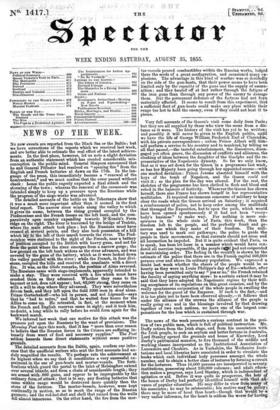NEWS OF THE WEEK.
No new events are reported from the Black Sea or the Baltic ; but we have corrections of the reports which we received last week, and are better able to estimate the real effect of the latest achieve- ments. In the first place, however, let us note a slight deviation from an authentic statement whieh has created considerable mis- conception in the public mind. General Simpson announced that he and General Pelissier had resolved on "opening fire" from the English and French batteries at dawn on the 17th. In the lan- guage of the press, this immediately became a "renewal of the bombardment," and we must confess that the error passed without check: hence the public eagerly expected a final attack and the storming of the town ; whereas the renewal of the cannonade was intended simply to keep up a pressure upon the Russians while the progress of the siege-works was advanced. The detailed accounts of the battle on the Tchernaya show that it was a much more important affair than it seemed in the first brief report. The narrow river winds along the valley to which it gives its name, between the rising ground occupied by the Piedmontese and the French troops on the left bank, and the com- paratively open country expanding towards M'Kenzie's Farm ridge on the right. The river is traversed by the bridge of Traktir, where the main attack took place ; but the Russians must have crossed at several points, and they also took possession of a hill which lay to the left of their march towards the river. The Pied- montese were stationed to the right of the French, near a battery of position occupied by the British with heavy guns, and not far from thepoint where the river emerges from a narrow gorge; the low ground on the left bank widens as the river advances, and was covered by the guns of the battery, which as it were looked down the 'valley parallel with the river ; while the French, in four divi- sions, occupied the hills and received the assailants with a direct fire. It was, as the Globe remarks, the position of Alma reversed. The Russians came with siege-implements, apparently intended to make a stay. They were received with a fire which must have crushed them as they advanced. Whether they came to the bayonet or not, does not appear ; but, 60,000 strong, they came on with a will to stop where they advanced. They were nevertheless driven back, and they left upon the field 3300 men in dead alone. Prince Gorteehakoff—who led in person, and not Liprandi—says that he "had to retire," and that he waited four hours for the Allies to come up. He retreated, in fact, at the moment when the French and English reserves came in sight ; and it took him, no doubt, a long while to rally before he could form again for the backward march.
We inferred last week that one motive for this attack was the pressure put upon the Russians by the want of provisions. The Morning Post says this week, that it has "more than ever reason to believe that the Russian forces in the Crimea are suffering in- tensely from want of food and necessary supplies." The Post seldom hazards these direct statements without some positive grounds. The detailed accounts from the Baltic, again, confirm our infer- ence that the unofficial writers who sent the first accounts had un- duly magnified the results. We perhaps rate the achievement at its highest when we say that it constitutes a very successful ex- periment in the use of gun-boats and mortar-vessels. The forti- fications which guard the portal to the inlet of Helsingfors extend over several islands, and form a chain of considerable length; they are armed with 800 guns, and appear to be impregnable by the ordinary form,of attack; that is to say, any floating batteries that came within range would be destroyed more quickly than the stone of the fortress. The mortar-vessels, however, were kept continually in motion, so as to mock the range of the Russian pnners; and the red-hot shot and shell that rained from the walls 141 almost innocuous. On the other hand, the fire from the mor-
tar-vessels poured combustibles within the Russian works, lodged there the seeds of a great conflagration, and occasioned many ex- plosions. The advantage in this kind of warfare was so decidedly on the side of the gun-boats, that their power seems to have been limited only by the capacity of the guns and the supply of ammu- nition; and they hauled off at last rather through the fatigue of the iron guns than through any power of the enemy to damage them. But the permanent defences of the fortress had not been materially affected. It seems to result from this experiment, that a sufficient fleet of gun-boats could make any place within their range too hot to hold the enemy, even if they could not beat it to pieces.
























